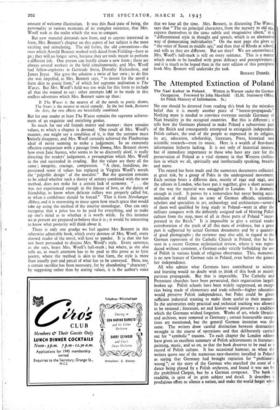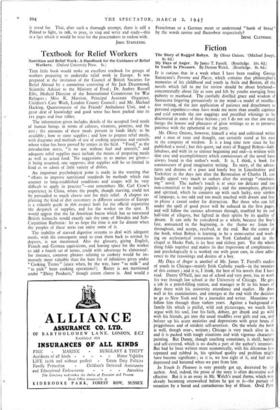The Attempted Extinction of Poland
The Nazi Kultur in Poland. Written in Warsaw under the German Occupation. Foreword by John Masefield. (H.M. Stationery Office, for Polish Ministry of Information. 5s.) No one should be deterred from reading this book by the mistaken belief that it is merely another piece of "horror-propaganda." Nothing more is needed to convince everyone outside Germany of Nazi brutality in the occupied countries. But this is different ; it tells how the Germans planned to make Poland a subservient part of the Reich and consequently attempted to extinguish independent Polish culture, the soul of the people as expressed in its religion, its art, education, scholarship, literature, Press, historical and scientific research—even its music. Here is a wealth of first-hand information hitherto lacking. It is not only of historical interest, but of immediate importance to those who have any care for the preservation of Poland as a vital element in that Western civilisa- tion in which we all, spiritually and intellectually speaking, breathe and move.
The, record has been made and the numerous documents collected. at great risk, by a group of Poles in the underground movement. Each section bears a different date, mainly of 1941 and top, and the editors in London, who have put it together, give a short account of the way the material was smuggled to London. It is dramatic enough in itself. It proves by a remorseless but never boring accu- mulation of detail that an army of German officials, scientists, scholars and specialists in art, archaeology and architecture—several of them well qualified by long study in Poland—went in after the military conquest with the definitely assigned task of blotting Polish culture from the map, most of all in those parts of Poland "incor- porated in the Reich." It is impossible to give a critical reader corroboration of the truth of all this mass of evidence, but a great part is supported by actual German documents and by a quantity of good photographs ; the reviewer may also add, in regard to the German repression of the Catholic Church in Poland, that he has seen in a recent German ecclesiastical review, where it was repro- duced without comment, a German order strictly forbidding the use of Polish in various kinds of religious observance. This, moreover, is no new feature of German rule in Poland, even before she gained her independence.
All who admire what Germans have contributed to science and learning would no doubt wish to think of this book as. mainly partisan propaganda. But that is impossible. The Catholic and Protestant churches have been persecuted, their organisation largely broken up. Polish schools have been widely suppressed, an excep- tion being made of elementary and trade schools—higher education would preserve Polish independence, but Poles could be given sufficient industrial training to make them useful to their masters. In the universities only practical and:technical teaching was allowed to be restored ; literature, art and history would preserve a tradition which the Germans wished forgotten. Works of art, whole libraries and archives, were removed to Germany; certain honourable excep- tions are mentioned, but the general German intention was the same. The writers draw careful distinction between destruction wrought in the course of operations and that deliberately carried out for " symbolic " reasons. To each chapter the London editors have given an excellent summary of Polish achievements in literature. painting, music, and so on, so that the book deserves to be read as a record of Polish culture. It has occasional humour, as when the writers quote one of the numerous race-theorists installed in Poland as saying that Germany had brought expiation for "prehistoric wrong! ; or the story of the German who snatched the score of 3 dance being played by a Polish orchestra, and found it was not by the prohibited Chopin, but by a German composer. The book h readable, in spite of its grim subject and detail. It describes a prodigious effort to silence a nation, and make the world forget what
it stood for. Tha•t, after such a thorough attempt, there is still a Poland to fight, to talk, to pray, to sing and write and study—this is a fact which it would be wise for the peacemakers to reckon with.
JOHN STAPLETON.



























 Previous page
Previous page